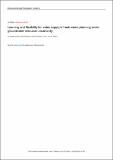| dc.contributor.author | Fletcher, Sarah Marie | |
| dc.contributor.author | Strzepek, Kenneth | |
| dc.contributor.author | AlSaati, Adnan | |
| dc.contributor.author | de Weck, Olivier L | |
| dc.date.accessioned | 2020-01-21T19:01:50Z | |
| dc.date.available | 2020-01-21T19:01:50Z | |
| dc.date.issued | 2019-11-06 | |
| dc.date.submitted | 2019-04-16 | |
| dc.identifier.issn | 1748-9326 | |
| dc.identifier.uri | https://hdl.handle.net/1721.1/123491 | |
| dc.description.abstract | Water supply infrastructure planning in groundwater-dependent regions is often challenged by uncertainty in future groundwater resource availability. Many major aquifer systems face long-term water table decline due to unsustainable withdrawals. However, many regions, especially those in the developing world, have a scarcity of groundwater data. This creates large uncertainties in groundwater resource predictions and decisions about whether to develop alternative supply sources. Developing infrastructure too soon can lead to unnecessary and expensive irreversible investments, but waiting too long can threaten water supply reliability. This study develops an adaptive infrastructure planning framework that applies Bayesian learning on groundwater observations to assess opportunities to learn about groundwater availability in the future and adapt infrastructure plans. This approach allows planners in data scarce regions to assess under what conditions a flexible infrastructure planning approach, in which initial plans are made but infrastructure development is deferred, can mitigate the risk of overbuilding infrastructure while maintaining water supply reliability in the face of uncertainty. This framework connects engineering options analysis from infrastructure planning to groundwater resources modeling. We demonstrate a proof-of-concept on a desalination planning case for the city of Riyadh, Saudi Arabia, where poor characterization of a fossil aquifer creates uncertainty in how long current groundwater resources can reliably supply demand. We find that a flexible planning approach reduces the risk of over-building infrastructure compared to a traditional static planning approach by 40% with minimal reliability risk (<1%). This striking result may be explained by the slow-evolving nature of groundwater decline, which provides time for planners to react, in contrast to more sudden risks such as flooding where tradeoffs between cost and reliability risk are heightened. This Bayesian approach shows promise for many civil infrastructure domains by providing a method to quantify learning in environmental modeling and assess the effectiveness of adaptive planning. Keywords: groundwater; adaptive planning; infrastructure; uncertainty; decision support | en_US |
| dc.publisher | Institute of Physics Publishing | en_US |
| dc.relation.isversionof | https://doi.org/10.1088/1748-9326/ab4664 | en_US |
| dc.rights | Creative Commons Attribution 4.0 International license | en_US |
| dc.rights.uri | https://creativecommons.org/licenses/by/4.0/ | en_US |
| dc.source | IOP Publishing | en_US |
| dc.subject | Renewable Energy, Sustainability and the Environment | en_US |
| dc.subject | Public Health, Environmental and Occupational Health | en_US |
| dc.subject | General Environmental Science | en_US |
| dc.title | Learning and flexibility for water supply infrastructure planning under groundwater resource uncertainty | en_US |
| dc.type | Article | en_US |
| dc.identifier.citation | Fletcher, Sarah et al. "Learning and flexibility for water supply infrastructure planning under groundwater resource uncertainty." Environmental Research Letters, 14, 11 (November 2019): 114022 © The Authors | en_US |
| dc.contributor.department | Massachusetts Institute of Technology. Department of Civil and Environmental Engineering | en_US |
| dc.contributor.department | Massachusetts Institute of Technology. Joint Program on the Science & Policy of Global Change | en_US |
| dc.contributor.department | Massachusetts Institute of Technology. Institute for Data, Systems, and Society | en_US |
| dc.relation.journal | Environmental Research Lettters | en_US |
| dc.eprint.version | Final published version | en_US |
| dc.type.uri | http://purl.org/eprint/type/JournalArticle | en_US |
| eprint.status | http://purl.org/eprint/status/PeerReviewed | en_US |
| dspace.date.submission | 2019-12-10T14:50:52Z | |
| mit.journal.volume | 14 | en_US |
| mit.journal.issue | 11 | en_US |
| mit.metadata.status | Complete | |
